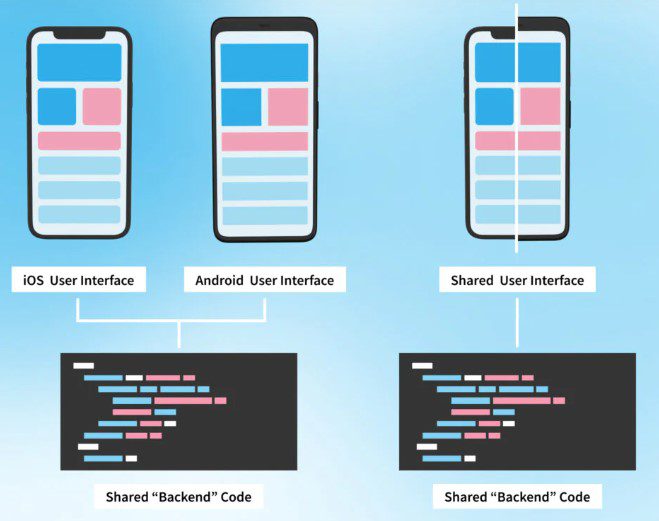In today’s tech-driven world, mobile technologies play a pivotal role in our daily lives. From communication to health management, mobile devices have become indispensable. With Android and iOS dominating the market, the choice of a mobile application development solution is crucial. This article explores Xamarin, a powerful option for multiplatform mobile app development, offering efficiency and cost-effectiveness.
Understanding Xamarin

Xamarin Development
Xamarin is an open-source framework by Microsoft, facilitating the creation of cross-platform apps for iOS, Android, and Windows using a single C# and .NET codebase. Renowned companies like Bosch, Siemens, Slack, and Pinterest have harnessed Xamarin for their mobile solutions.
Xamarin Development: Main Features
1. Cross-Platform Capabilities
Creating applications for multiple platforms simultaneously enhances competitiveness. Xamarin allows developers to choose between Xamarin.Native and Xamarin.Forms, each with its unique advantages.
2. Xamarin.Native vs. Xamarin.Forms: Decoding the Differences
2.1 Xamarin.Native: Tailored for Specific Platforms
Xamarin.iOS and Xamarin.Android, collectively known as Xamarin.Native, are designed for a native user experience on each platform, offering greater control.
2.2 Xamarin.Forms: Streamlined Cross-Platform Development
Xamarin.Forms, an extension of Xamarin.Native, enables developers to reuse the same UI code across multiple platforms, expediting the development cycle.
3. Time Efficiency in Mobile Development
Xamarin.Native boasts a 75% code-sharing rate, while Xamarin.Forms takes the lead with 95%, reducing development time significantly.
4. Cost Considerations
Choosing between Xamarin.Native and Xamarin.Forms involves weighing the costs associated with native and hybrid applications. Xamarin.Forms proves cost-effective, requiring minimal Xamarin expertise.
5. User Interface Complexity
Xamarin.Forms, allowing cross-platform UI code, may have limitations in handling complex graphics. Xamarin.Native, with platform-specific APIs, is better suited for intricate user interfaces.
6. Maintenance and Updates
Maintaining a shared codebase in Xamarin.Forms proves more efficient for frequent updates, while Xamarin.Native demands attention to individual platform code, potentially incurring longer timelines and higher costs.
7. Application Functionality
Xamarin.Native excels in providing access to platform-specific features, making it ideal for applications with diverse functionalities across platforms.
Xamarin App Development: Advantages and Disadvantages
The Future of Xamarin: Transition to .NET 6
NET 6 was already in development, and Microsoft was actively working on unifying the different flavors of .NET, including Xamarin, into a single platform. Please note that the information might have evolved since then, and it’s advisable to check the latest sources for the most up-to-date information.
As of the .NET 6 release and the subsequent updates, the following points were anticipated for Xamarin within the context of the transition to .NET 6:
-
Unified .NET Platform
- Advantage: Xamarin was expected to be fully integrated into the unified .NET platform. This meant that developers could use a single set of APIs and tools for building applications that target a variety of platforms, including mobile (iOS, Android), desktop, cloud, and more.
-
Single Project Model
- Advantage: The transition aimed to provide a unified project model that could be used to build applications for multiple platforms. This was expected to simplify the development process by allowing developers to manage all aspects of their application in a single project file.
-
Performance Improvements
- Advantage: .NET 6 was expected to bring performance improvements across the board, and this would likely benefit Xamarin developers as well. Faster execution times and optimizations were anticipated to enhance the overall performance of Xamarin applications.
-
.NET MAUI (Multi-platform App UI)
- Advantage: .NET MAUI, a part of .NET 6, was anticipated to be the evolution of Xamarin.Forms. It aimed to provide a single framework for building cross-platform applications with a unified UI toolkit. .NET MAUI was designed to support mobile and desktop platforms.
-
Enhanced Developer Productivity
- Advantage: With the unification of the .NET platform and improvements in tooling, developers were expected to experience enhanced productivity. The transition aimed to streamline workflows and provide a more cohesive development experience.
-
Continued Support for Xamarin
- Advantage: Microsoft has shown a commitment to supporting and improving Xamarin, and this was expected to continue with the transition to .NET 6. Xamarin developers could anticipate ongoing updates, bug fixes, and feature enhancements.
-
Community and Ecosystem
- Advantage: The transition to .NET 6 was expected to strengthen the overall .NET ecosystem, including Xamarin. A unified platform could foster collaboration, and the shared knowledge and resources within the broader .NET community could benefit Xamarin developers.
In summary, the transition to .NET 6 was poised to bring several advantages to Xamarin developers, including a unified platform, improved performance, and enhanced productivity. The move towards .NET MAUI signaled a commitment to providing a modern and unified framework for building cross-platform applications. Developers interested in Xamarin and .NET 6 should consult the latest documentation and release notes for the most current information.
Conclusion
Despite its upcoming transition, Xamarin remains a robust choice for developers aiming for cross-platform excellence. Businesses seeking flexibility and scalability often find Xamarin advantageous, especially for projects covering diverse platforms and systems.
For those considering Xamarin app development, partnering with NIX ensures access to a skilled Xamarin mobile app development team. Contact NIX today to take the first step toward achieving your business goals!